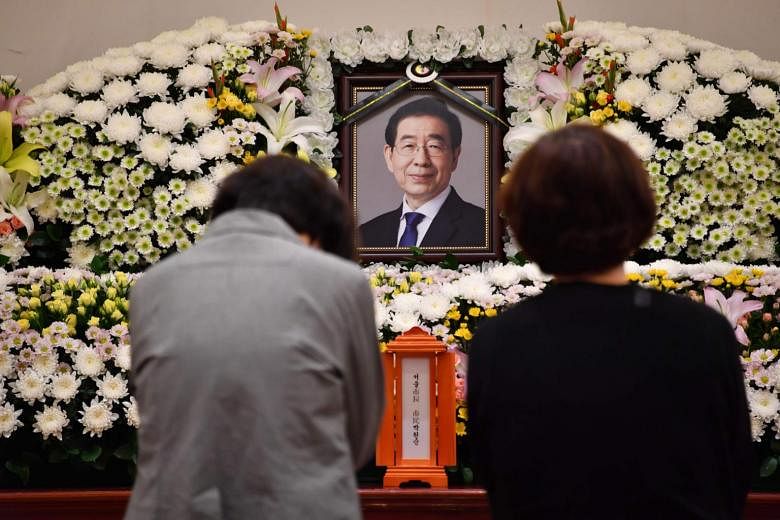SEOUL - Four years after being sexually harassed by her boss - the mayor of Seoul city - and ignored when she sought help within the office, the woman mustered all her courage to report him to the police.
"I wanted to receive a humane apology and (for him to) be judged by the law," she said in a statement.
But it was not to be.
Mr Park Won-soon was found dead in an apparent suicide in the woods of Mount Bugak on July 10, two days after his former secretary lodged a police complaint against him.
This made him the fourth in a string of politicians from the ruling Democratic Party (DP) to be hit by sex scandals - one is currently in jail for repeatedly raping his secretary - and his case was all the more shocking, as he had earned a reputation for fighting for women's rights from as early as the 1980s when he was a lawyer.
His death has also prompted soul searching about deep-rooted malpractices in South Korea's male-dominated work environment, as more women are now emboldened to speak up against a backdrop of a global #MeToo movement against sexual harassment.
Legally, the police case has been closed, as South Korean law does not allow indictment against a dead suspect.
But the victim, whose identity is withheld, refuses to be silenced. She has held two press conferences, speaking through her lawyer, and she helped the police to unlock Mr Park's phone on July 22.
She is backed by women's rights groups, who are calling for investigations into how Seoul city officials condoned sexual abuse and ignored her pleas for help, instead telling her that a secretary's main duty was to "make the mayor happy".
"It is a case of organised crime sustained by power," the groups said.
Last Tuesday, dozens of activists held a rally in front of Seoul city hall asking for the National Human Rights Commission to investigate the allegations against the late mayor.
Their wish was granted two days later, when the commission announced their representatives had been in talks with the victim and will launch a probe into the case and a review of government measures against sexual harassment involving high-ranking officials.
Law professor Lee Jae-min of Seoul National University said there is still a need to find out the truth, despite the mayor's death.
"Given the gravity of the situation and the people involved, including Mayor Park, the necessary investigations by the relevant government agencies will continue to be carried out, even though it takes time. We need to clarify what happened," he told The Straits Times.
South Korea's patriarchal society and hierarchical work culture makes it hard for a female subordinate to say no to a male superior's demands, even if sexual in nature, for fear of losing her job.

In Mr Park's case, the victim said she approached some 20 people in the office for help but did not get any support. Some waved it off expressing disbelief, while some blamed her for being "pretty".
"Let his death lead to a deeper reflection and frank discussion on the toxic grips of sexual harassment in the workplace, and in our culture at large," human sciences professor Cho Kyung-jin of Cyber University of Korea said in a commentary for The Korea Times newspaper.
"This is not about labeling Mayor Park as a pervert, nor is it about denying his legacy. It is about recognising a system that enables powerful men to take advantage of their position to do what they please with female staff in the lower echelons of the rank-and-file."
Meanwhile, political watchers warn that the sexual abuse surfacing in the DP does not bode well for the ruling party and President Moon Jae-in, both of whom rose to power promising gender equality and better treatment of women.
"The fact that officials from Moon's party are involved in sexual abuse against women makes a mockery of the president's efforts," said Ms Jessica Lee, a senior research fellow on East Asia at Quincy Institute.
She added that the allegations against Mr Park could "spell trouble" for the Moon administration in the remaining two years of his five-year term, especially if the ruling party loses the mayoral seats in Seoul and Busan - the country's two largest and most important cities - in by-elections slated for April next year.
Former Busan mayor Oh Keo-don had resigned in April after sexual harassment charges against him surfaced.
Associate professor of international studies Leif-Eric Easley of Ewha Womans University said the ruling party's popularity has been "damaged by scandals". He also warned that "leaders taking their own lives may now be seen as a political risk factor for the country".
Lawmaker Nam In-soon, the head of DP's sexual abuse eradication task force and a close ally of the late Seoul mayor, offered a tearful apology last Monday.
"The world has changed, and so has the public's viewpoint," she was cited as saying. "Female voters will no longer want to support the Democratic Party after seeing a string of sexual abuse cases involving DP local government heads."


